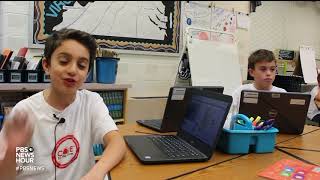JUDY WOODRUFF: Now, a special series on the future of work that comes from our Student Reporting Labs. Tonight: a new program to make computer coding part of elementary education. It was produced by students at Dominion High School in Sterling, Virginia.
STUDENT: It's this unicorn full of magic and rainbows and butterflies and a whole bunch of awesome stuff.
NARRATOR: Code to the Future is a nationwide computer science immersion program that has set up shop at three Loudoun County elementary schools in Virginia. Joshua Johnson is an instructional coach and curriculum designer for the organization.
JOSHUA JOHNSON, Code to the Future: Our main goal is to provide students kind of that spark early on in grades K through 5 to get them excited about coding, excited about computer science, and hopefully open some doors for them to pursue computer science in their future.
NARRATOR: At Round Hill Elementary School, students showcased their first projects at Epic Build Night, a community event where family and friends are invited to come in and see what kids have been working on. Andrew Davis is the school's principal.
ANDREW DAVIS, Principal, Round Hill Elementary School: The fact of the matter is, we cannot continue to do things the same way, and expect our students to be any more prepared for the world that's awaiting them.
WALID AYYAS, Student: Pretty much coding, to me, is an endless world, where you can, like, change everything and so many different combinations to make new video games.

NARRATOR: Principal Herman Mizell at Meadowland Elementary School values the positive impact of coding beyond the classroom.
HERMAN MIZELL, Principal, Meadowland Elementary School: In order to prepare our students to access and navigate the world, and not only that, but to compete globally, we want to make sure that our students are embracing coding and that they have that experience.
NARRATOR: Students Kate Taylor and Xander Bush were surprised to find that coding is fun.
KATE TAYLOR, Student: It has a lot to do with other jobs, and I think even if I get a job someday and it doesn't incorporate code, then I would still like to have the talent to code.
XANDER BUSH, Student: I think I would do it not for the fame, but more as in something doing I love, and it's like a passion.
NARRATOR: Back at Round Hill Elementary School, Omari Faulkner has seen the positive impact of the coding program on his son.
OMARI FAULKNER, Parent: In an environment of everyone is all hands in, all hands on deck, learning new things, and you can start to see the students are becoming the leaders.
NARRATOR: School leaders say the benefits for students participating in the program are limitless.
HERMAN MIZELL: Kids need to be able to articulate their ideas and thoughts. And, to me, coding provides that opportunity. You want your students to be able to compete in this global society. You want your students to be able to access and navigate the world, and coding is a great start.
NARRATOR: For the PBS NewsHour, Student Reporting Labs, I'm Grace Aprahamian in Sterling, Virginia.
JUDY WOODRUFF: What a great project.












